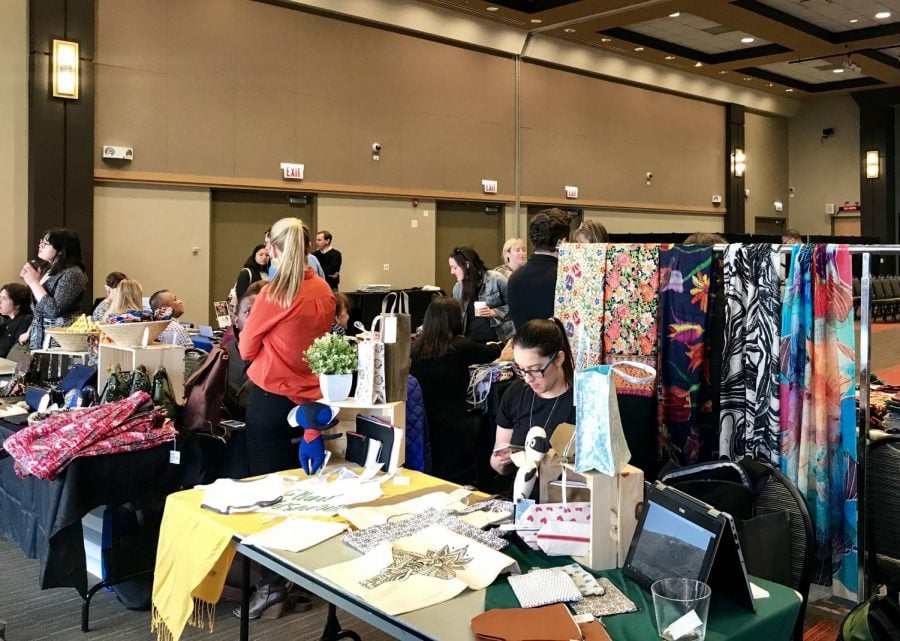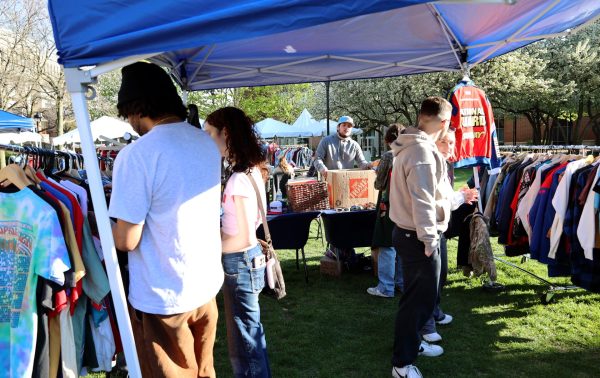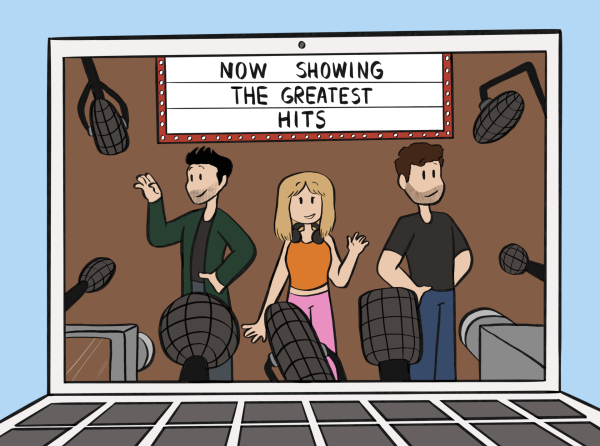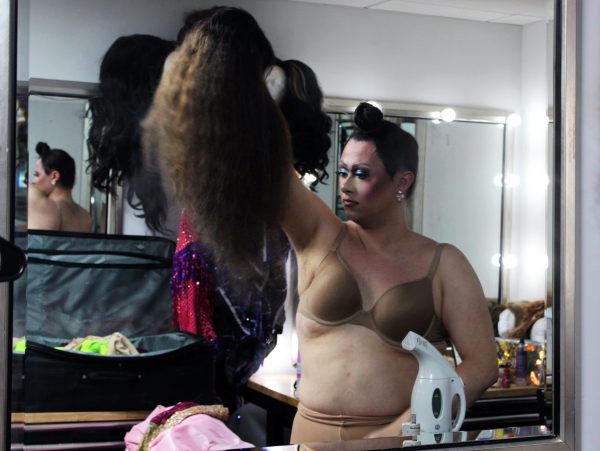Reduce, reuse, revolution
DePaul sets sights on sustainability
DePaul’s Fashion Revolution centers around supporting ethical and sustainable clothing choices. This event takes place days before Earth Day each year. Mackenzie Born | The DePaulia
Where are those must-have new clothes coming from? Where are they made and who’s making them? It’s a question that many of us don’t ask ourselves – but the Fashion Revolution Fair hosted by DePaul University wants us to start.
In an era dominated by fast fashion, DePaul’s Fashion Revolution centers around supporting ethical and sustainable clothing choices. In remembrance of the 2013 Rana Plaza collapse in Bangladesh, the deadliest garment industry accident in history, the event focuses on the need for a major shift in our fashion habits – away from fast fashion and towards ethically and socially responsibly-sourced clothing.
The Fashion Revolution is also held just a few days before Earth Day, reminding us of the impact our fashion choices have on the environment. Earth Day 2018 was all about reducing plastic waste, and fast fashion trends over the last decade have contributed to enormous amounts of textile waste on land and in the world’s oceans. According to the World Resources Institute, we’re buying 60 percent more clothing than we were in 2000 and keeping it for half as long, sending 85 percent of those clothes to a landfill. Worse still, the invisible plastic microfibers from many of our fast fashion items are causing serious damage to the environment.
So how can we change? In an era dominated by the fast fashion industry, what can we do to make sure we are buying ethically made clothing and doing our part to reduce textile pollution while still managing to shop on a budget? We spoke to vendors, volunteers and students at the Fashion Revolution Fair about some simple steps we can all take to get moving in the right direction.
Do your research
“Educating yourself is the biggest thing you can do,” said Jaslin Marcos, DePaul student and volunteer at Sustainability Magazine. “It can be a very ominous subject. But there are apps now that will help rate the sustainability of your clothing, a lot of websites have sustainability and supply chain sections, and the fair trade coalition itself has great information.”
There are even some local Chicago sustainable brands, like Mata Traders, which support fair trade practices in their clothing production. “One woman stitches the whole dress,” said Jonit Bookheim, director of sales at Mata. “It’s not a factory production line. With our clothing, one seamstress has all the pieces and creates the whole thing.”
Mata produces quality, long-lasting clothing and emphasizes the empowerment of their female workers, focusing on fair wages, providing benefits, and allowing the workers to control the rate of production.
Thrift stores are your friend
Forget the weird-smelling stores filled with even weirder old clothes. Thrift stores have changed, and many of them buy and sell higher-end fashionable items and designer labels at ridiculously low prices. For those that don’t have a significant shopping budget, thrift stores can be the perfect way to circulate new pieces into your wardrobe while avoiding fast fashion chains.
“I find that for my price range, thrifting at local thrift stores and even trying to fix the clothes I have already is the best way to go,” said Grant Smith, a junior at DePaul University who recognizes the challenges for students with a limited budget to avoid the cheap fast fashion stores in Chicago. “I encourage my friends to do the same,” he said.
For God’s sake, don’t throw your old clothes in the trash
Just don’t. There are way too many options available now to get rid of unwanted clothing in a sustainable way so they don’t end up in a landfill. Donate them, sell them, or trade them with friends. DePaul’s Fashion Revolution holds a clothing swap where people can bring old clothes to trade, H&M has their own in-store clothing recycling program, and stores like Buffalo Exchange and Crossroads Trading Co. buy second-hand clothes in return for cash or store credit. If none of those work for you, donate to a homeless shelter, Goodwill or the Salvation Army.
Basics, basics, basics
Do your research and invest in some high-quality, sustainably made basics. The thing about basics is they never go out of style. And if you are buying for quality, they will last.
“I’ve tried to move away from the cheap basics at places like H&M or Forever 21,” said student Hannah Jake. “It’s worth it to spend more and have a few staple items that last. You feel much better in them, too.”
For younger adults on a limited budget, it can be hard to throw in that extra cash for sustainably made, higher-end clothing. But Marcos argues we need to start moving in that direction.
“If you do save up for that big-ticket item, it will last you forever. So why not wait?” asked Marcos. “Practice being mindful and practice slowing down your shopping habits.”
We have to lead the way
It comes down to us as consumers to reverse the fast fashion trend and encourage the production of sustainably and ethically made clothes. Bookheim of Mata Traders hopes to change the idea that buying new, sustainably-made clothing is costly. “People assume it’s really expensive to buy ethically,” said Bookheim. “But that’s not necessarily the case.” Mata Traders holds warehouse sales where everything in the store is 25 dollars, encouraging people to buy sustainably and helping them do it at a reasonable price.
“We’re not telling you to stop shopping completely. No one wants to hear that,” said Marcos. “We’re telling you to slow down, be conscious, and say, even though this might make me happy, does this make everyone happy? It’s not a linear process, it’s circular.”






![DePaul sophomore Greta Atilano helps a young Pretty Cool Ice Cream customer pick out an ice cream flavor on Friday, April 19, 2024. Its the perfect job for a college student,” Atilano said. “I started working here my freshman year. I always try to work for small businesses [and] putting back into the community. Of course, interacting with kids is a lot of fun too.](https://depauliaonline.com/wp-content/uploads/2024/04/ONLINE_1-IceCream-600x400.jpg)










